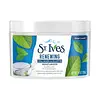What's inside
What's inside
 Key Ingredients
Key Ingredients

No key ingredients
 Benefits
Benefits

 Concerns
Concerns

 Ingredients Side-by-side
Ingredients Side-by-side

Water
Skin ConditioningGlycerin
HumectantCetearyl Alcohol
EmollientCaprylic/Capric Triglyceride
MaskingCetyl Alcohol
EmollientCeteareth-20
CleansingPetrolatum
EmollientDimethicone
EmollientPhenoxyethanol
PreservativeBehentrimonium Methosulfate
Potassium Phosphate
BufferingEthylhexylglycerin
Skin ConditioningSodium Lauroyl Lactylate
EmulsifyingDisodium EDTA
Dipotassium Phosphate
BufferingCeramide NP
Skin ConditioningCeramide AP
Skin ConditioningPhytosphingosine
Skin ConditioningCholesterol
EmollientXanthan Gum
EmulsifyingCarbomer
Emulsion StabilisingSodium Hyaluronate
HumectantTocopherol
AntioxidantCeramide EOP
Skin ConditioningWater, Glycerin, Cetearyl Alcohol, Caprylic/Capric Triglyceride, Cetyl Alcohol, Ceteareth-20, Petrolatum, Dimethicone, Phenoxyethanol, Behentrimonium Methosulfate, Potassium Phosphate, Ethylhexylglycerin, Sodium Lauroyl Lactylate, Disodium EDTA, Dipotassium Phosphate, Ceramide NP, Ceramide AP, Phytosphingosine, Cholesterol, Xanthan Gum, Carbomer, Sodium Hyaluronate, Tocopherol, Ceramide EOP
Water
Skin ConditioningParaffinum Liquidum
EmollientPropylene Glycol
HumectantPEG-100 Stearate
Glyceryl Stearate
EmollientStearic Acid
CleansingPhenoxyethanol
PreservativeCarthamus Tinctorius Seed Oil
MaskingTriethanolamine
BufferingCarbomer
Emulsion StabilisingDimethicone
EmollientCetyl Alcohol
EmollientDisodium EDTA
Parfum
MaskingEthylhexylglycerin
Skin ConditioningLinalool
PerfumingHexyl Cinnamal
PerfumingHydrolyzed Elastin
EmollientHydrolyzed Collagen
EmollientCoumarin
PerfumingGeraniol
PerfumingWater, Paraffinum Liquidum, Propylene Glycol, PEG-100 Stearate, Glyceryl Stearate, Stearic Acid, Phenoxyethanol, Carthamus Tinctorius Seed Oil, Triethanolamine, Carbomer, Dimethicone, Cetyl Alcohol, Disodium EDTA, Parfum, Ethylhexylglycerin, Linalool, Hexyl Cinnamal, Hydrolyzed Elastin, Hydrolyzed Collagen, Coumarin, Geraniol
 Reviews
Reviews

Ingredients Explained
These ingredients are found in both products.
Ingredients higher up in an ingredient list are typically present in a larger amount.
Carbomer is a polymer of acrylic acid. Its main role is to create a gel consistency.
A high amount of carbomer can cause pilling or balling up of products. Don't worry, most products contain 1% or less of carbomer.
Cetyl Alcohol is a fatty alcohol. Fatty Alcohols are most often used as an emollient or to thicken a product.
Its main roles are:
Though it has "alcohol" in the name, it is not related to denatured alcohol or ethyl alcohol.
The FDA allows products labeled "alcohol-free" to have fatty alcohols.
Learn more about Cetyl AlcoholDimethicone is a type of synthetic silicone created from natural materials such as quartz.
What it does:
Dimethicone comes in different viscosities:
Depending on the viscosity, dimethicone has different properties.
Ingredients lists don't always show which type is used, so we recommend reaching out to the brand if you have questions about the viscosity.
This ingredient is unlikely to cause irritation because it does not get absorbed into skin. However, people with silicone allergies should be careful about using this ingredient.
Note: Dimethicone may contribute to pilling. This is because it is not oil or water soluble, so pilling may occur when layered with products. When mixed with heavy oils in a formula, the outcome is also quite greasy.
Learn more about DimethiconeDisodium EDTA plays a role in making products more stable by aiding other preservatives.
It is a chelating agent, meaning it neutralizes metal ions that may be found in a product.
Disodium EDTA is a salt of edetic acid and is found to be safe in cosmetic ingredients.
Learn more about Disodium EDTAEthylhexylglycerin (we can't pronounce this either) is commonly used as a preservative and skin softener. It is derived from glyceryl.
You might see Ethylhexylglycerin often paired with other preservatives such as phenoxyethanol. Ethylhexylglycerin has been found to increase the effectiveness of these other preservatives.
Phenoxyethanol is a preservative that has germicide, antimicrobial, and aromatic properties. Studies show that phenoxyethanol can prevent microbial growth. By itself, it has a scent that is similar to that of a rose.
It's often used in formulations along with Caprylyl Glycol to preserve the shelf life of products.
Water. It's the most common cosmetic ingredient of all. You'll usually see it at the top of ingredient lists, meaning that it makes up the largest part of the product.
So why is it so popular? Water most often acts as a solvent - this means that it helps dissolve other ingredients into the formulation.
You'll also recognize water as that liquid we all need to stay alive. If you see this, drink a glass of water. Stay hydrated!
Learn more about Water